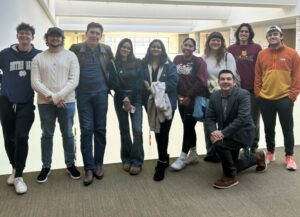Korbel ranked 12th best place in the world to earn a master’s degree in international relations.
Korbel ranked 20th in the world for the best undergraduate degree in international studies.
Korbel ranked 12th best place in the world to earn a master’s degree in international relations.
Korbel ranked 20th in the world for the best undergraduate degree in international studies.
Bridging Worlds: How One Professor Weaves Urban Planning, Democracy, and Education

Teaching Assistant Professor Dr. Stefan Chavez-Norgaard’s lifelong interest in public policy began at just six years old. As he took Philadelphia’s SEPTA train from his grandparents’ house to Center City, he was struck by the disparate quality of livelihoods visible from his window. “Even as a young kid,” he said, “I was shocked by the inequalities that the city line could mean in terms of land use, tree cover, and house size.”
That early awareness of inequity sparked a lifelong passion for public policy and urban planning, one that eventually brought him to the Josef Korbel School of International Studies, where he is now completing his first year as a faculty member.
“That’s where it all started,” he reflected. “A six-year-old visiting his grandparents with his mom and dad.”
That moment on the train sparked more than curiosity; it ignited a lifelong commitment to understanding how people with different lived experiences exist alongside one another, and how systems can either support or hinder that possibility. “The throughline across all my research is how can people of different backgrounds — racial, ethnic, gender, and class — live together side by side, as opposed to being separated by walls, segregation, and disparity,” Dr. Chavez-Norgaard explained.
That guiding question led him to Johannesburg, South Africa, where he returned many times to study the Born Free Generation: the first cohort to come of age without direct memory of apartheid. “This generation represented a really amazing historical moment — a society of explicit racial hierarchy and oppression giving way to a multiracial democracy,” he said.
Dr. Chavez-Norgaard’s research centers on local democratic governance — bottom-up forms of engagement — and in Johannesburg, he found a powerful case study of a multiracial society striving to transcend its past. “I’ve stayed in touch with many of the original interviewees from my undergraduate thesis. They became interviewees in my PhD dissertation — and now, I would call them friends.”
The insights gained from this work not only shaped his academic journey but also drew him to Colorado, where he was born and raised, and where the intersection of democratic engagement and urban development offered new opportunities to continue his exploration. So, when the opening for a faculty position at the Korbel School popped up, Dr. Chavez-Norgaard was immediately interested. “There’s a sort of pragmatism about democratic problem solving in Colorado,” he said. “And then there’s the nature and beauty of the region as well as dynamism and growth.”
Throughout his first year, Dr. Chavez-Norgaard visited neighborhood associations and community organizations, which led to involvement in projects like the East Colfax Bus Rapid Transit (BRT) project. The effort to bring public transportation to this part of Denver required collaboration among a diverse range of stakeholders, creating a dynamic participatory process at the intersection of democratic principles and urban planning. “Who’s the envisioned rider of such a system?” he asked himself. “What about the displacement of existing residents of Colfax? Is BRT along Colfax even the right answer?” Projects like this, and the complex questions they raise, have affirmed that coming to Colorado was the right decision — a place where his research can take root and make a tangible impact.
All Dr. Chavez-Norgaard’s efforts networking across the city culminated in making his debut Public Policy Analysis classes possible – one for undergraduates and another for graduate students. “These aren’t your typical lecture-based courses,” he said. “They’re chances for students to dive into real-world policy work, connect with professionals, and explore how cities like Denver interact globally.” Throughout the quarter, students meet with a lineup of inspiring guest speakers, taking an experiential learning approach.
Some of the guest speakers are former ambassadors, representatives from institutions like the Truman Center, the Pacific Disaster Center, World Denver, and multiple members of the Colorado Consular Corps. Students work directly with the U.S. Department of State and Colorado’s Office of Economic Development and International Trade (OEDIT) on client-based projects.
Much of this is powered by the Korbel alumni network, which plays a big role in opening doors. Former students now working in these agencies are eager to give back, mentoring current students, and bringing their professional world into the classroom.
Dr. Chavez-Norgaard’s first year at Korbel has been defined by connection to his colleagues, students, and the broader Denver community. By grounding his teaching in hands-on experiences and his research in questions that matter across borders and backgrounds, he’s created a learning environment that is as intellectually rigorous as it is personally meaningful.
“I’ve felt welcomed and supported by the Korbel faculty from the very beginning, and I’m hoping to grow alongside faculty and staff colleagues at Korbel, whom I hope I can think of as lifelong friends,” he shared. That spirit of collaboration and purpose is shaping not just his own path, but the journeys of the next generation of public policy leaders — students learning to navigate complexity with clarity, empathy, and a drive to make a difference.
Copyright ©2025 | All Rights Reserved | Equal Opportunity Affirmative Action Institution